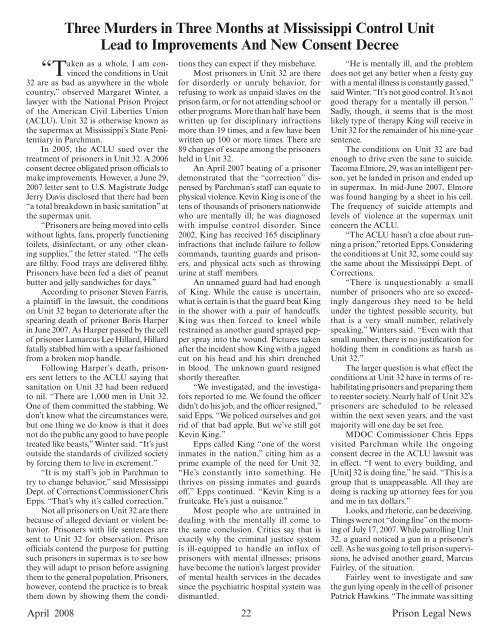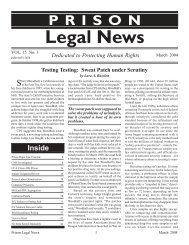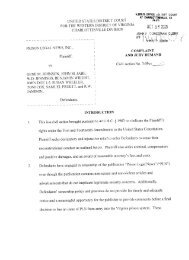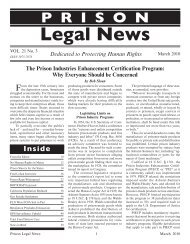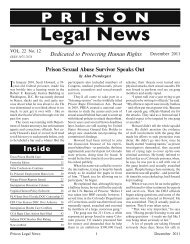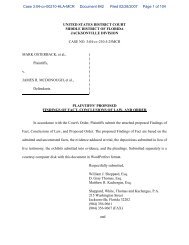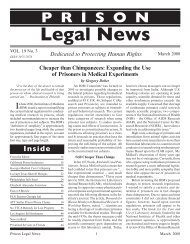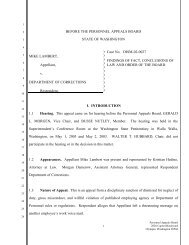From the Editor - Prison Legal News
From the Editor - Prison Legal News
From the Editor - Prison Legal News
Create successful ePaper yourself
Turn your PDF publications into a flip-book with our unique Google optimized e-Paper software.
April 2008<br />
Three Murders in Three Months at Mississippi Control Unit<br />
Lead to Improvements And New Consent Decree<br />
aken as a whole, I am con-<br />
<strong>the</strong> conditions in Unit<br />
“Tvinced<br />
32 are as bad as anywhere in <strong>the</strong> whole<br />
country,” observed Margaret Winter, a<br />
lawyer with <strong>the</strong> National <strong>Prison</strong> Project<br />
of <strong>the</strong> American Civil Liberties Union<br />
(ACLU). Unit 32 is o<strong>the</strong>rwise known as<br />
<strong>the</strong> supermax at Mississippi’s State Penitentiary<br />
in Parchman.<br />
In 2005, <strong>the</strong> ACLU sued over <strong>the</strong><br />
treatment of prisoners in Unit 32. A 2006<br />
consent decree obligated prison officials to<br />
make improvements. However, a June 29,<br />
2007 letter sent to U.S. Magistrate Judge<br />
Jerry Davis disclosed that <strong>the</strong>re had been<br />
“a total breakdown in basic sanitation” at<br />
<strong>the</strong> supermax unit.<br />
“<strong>Prison</strong>ers are being moved into cells<br />
without lights, fans, properly functioning<br />
toilets, disinfectant, or any o<strong>the</strong>r cleaning<br />
supplies,” <strong>the</strong> letter stated. “The cells<br />
are filthy. Food trays are delivered filthy.<br />
<strong>Prison</strong>ers have been fed a diet of peanut<br />
butter and jelly sandwiches for days.”<br />
According to prisoner Steven Farris,<br />
a plaintiff in <strong>the</strong> lawsuit, <strong>the</strong> conditions<br />
on Unit 32 began to deteriorate after <strong>the</strong><br />
spearing death of prisoner Boris Harper<br />
in June 2007. As Harper passed by <strong>the</strong> cell<br />
of prisoner Lamarcus Lee Hillard, Hillard<br />
fatally stabbed him with a spear fashioned<br />
from a broken mop handle.<br />
Following Harper’s death, prisoners<br />
sent letters to <strong>the</strong> ACLU saying that<br />
sanitation on Unit 32 had been reduced<br />
to nil. “There are 1,000 men in Unit 32.<br />
One of <strong>the</strong>m committed <strong>the</strong> stabbing. We<br />
don’t know what <strong>the</strong> circumstances were,<br />
but one thing we do know is that it does<br />
not do <strong>the</strong> public any good to have people<br />
treated like beasts,” Winter said. “It’s just<br />
outside <strong>the</strong> standards of civilized society<br />
by forcing <strong>the</strong>m to live in excrement.”<br />
“It is my staff’s job in Parchman to<br />
try to change behavior,” said Mississippi<br />
Dept. of Corrections Commissioner Chris<br />
Epps. “That’s why it’s called correction.”<br />
Not all prisoners on Unit 32 are <strong>the</strong>re<br />
because of alleged deviant or violent behavior.<br />
<strong>Prison</strong>ers with life sentences are<br />
sent to Unit 32 for observation. <strong>Prison</strong><br />
officials contend <strong>the</strong> purpose for putting<br />
such prisoners in supermax is to see how<br />
<strong>the</strong>y will adapt to prison before assigning<br />
<strong>the</strong>m to <strong>the</strong> general population. <strong>Prison</strong>ers,<br />
however, contend <strong>the</strong> practice is to break<br />
<strong>the</strong>m down by showing <strong>the</strong>m <strong>the</strong> conditions<br />
<strong>the</strong>y can expect if <strong>the</strong>y misbehave.<br />
Most prisoners in Unit 32 are <strong>the</strong>re<br />
for disorderly or unruly behavior, for<br />
refusing to work as unpaid slaves on <strong>the</strong><br />
prison farm, or for not attending school or<br />
o<strong>the</strong>r programs. More than half have been<br />
written up for disciplinary infractions<br />
more than 19 times, and a few have been<br />
written up 100 or more times. There are<br />
89 charges of escape among <strong>the</strong> prisoners<br />
held in Unit 32.<br />
An April 2007 beating of a prisoner<br />
demonstrated that <strong>the</strong> “correction” dispensed<br />
by Parchman’s staff can equate to<br />
physical violence. Kevin King is one of <strong>the</strong><br />
tens of thousands of prisoners nationwide<br />
who are mentally ill; he was diagnosed<br />
with impulse control disorder. Since<br />
2002, King has received 165 disciplinary<br />
infractions that include failure to follow<br />
commands, taunting guards and prisoners,<br />
and physical acts such as throwing<br />
urine at staff members.<br />
An unnamed guard had had enough<br />
of King. While <strong>the</strong> cause is uncertain,<br />
what is certain is that <strong>the</strong> guard beat King<br />
in <strong>the</strong> shower with a pair of handcuffs.<br />
King was <strong>the</strong>n forced to kneel while<br />
restrained as ano<strong>the</strong>r guard sprayed pepper<br />
spray into <strong>the</strong> wound. Pictures taken<br />
after <strong>the</strong> incident show King with a jagged<br />
cut on his head and his shirt drenched<br />
in blood. The unknown guard resigned<br />
shortly <strong>the</strong>reafter.<br />
“We investigated, and <strong>the</strong> investigators<br />
reported to me. We found <strong>the</strong> officer<br />
didn’t do his job, and <strong>the</strong> officer resigned,”<br />
said Epps. “We policed ourselves and got<br />
rid of that bad apple. But we’ve still got<br />
Kevin King.”<br />
Epps called King “one of <strong>the</strong> worst<br />
inmates in <strong>the</strong> nation,” citing him as a<br />
prime example of <strong>the</strong> need for Unit 32.<br />
“He’s constantly into something. He<br />
thrives on pissing inmates and guards<br />
off,” Epps continued. “Kevin King is a<br />
fruitcake. He’s just a nuisance.”<br />
Most people who are untrained in<br />
dealing with <strong>the</strong> mentally ill come to<br />
<strong>the</strong> same conclusion. Critics say that is<br />
exactly why <strong>the</strong> criminal justice system<br />
is ill-equipped to handle an influx of<br />
prisoners with mental illnesses; prisons<br />
have become <strong>the</strong> nation’s largest provider<br />
of mental health services in <strong>the</strong> decades<br />
since <strong>the</strong> psychiatric hospital system was<br />
dismantled.<br />
22<br />
“He is mentally ill, and <strong>the</strong> problem<br />
does not get any better when a feisty guy<br />
with a mental illness is constantly gassed,”<br />
said Winter. “It’s not good control. It’s not<br />
good <strong>the</strong>rapy for a mentally ill person.”<br />
Sadly, though, it seems that is <strong>the</strong> most<br />
likely type of <strong>the</strong>rapy King will receive in<br />
Unit 32 for <strong>the</strong> remainder of his nine-year<br />
sentence.<br />
The conditions on Unit 32 are bad<br />
enough to drive even <strong>the</strong> sane to suicide.<br />
Tacoma Elmore, 29, was an intelligent person,<br />
yet he landed in prison and ended up<br />
in supermax. In mid-June 2007, Elmore<br />
was found hanging by a sheet in his cell.<br />
The frequency of suicide attempts and<br />
levels of violence at <strong>the</strong> supermax unit<br />
concern <strong>the</strong> ACLU.<br />
“The ACLU hasn’t a clue about running<br />
a prison,” retorted Epps. Considering<br />
<strong>the</strong> conditions at Unit 32, some could say<br />
<strong>the</strong> same about <strong>the</strong> Mississippi Dept. of<br />
Corrections.<br />
“There is unquestionably a small<br />
number of prisoners who are so exceedingly<br />
dangerous <strong>the</strong>y need to be held<br />
under <strong>the</strong> tightest possible security, but<br />
that is a very small number, relatively<br />
speaking,” Winters said. “Even with that<br />
small number, <strong>the</strong>re is no justification for<br />
holding <strong>the</strong>m in conditions as harsh as<br />
Unit 32.”<br />
The larger question is what effect <strong>the</strong><br />
conditions at Unit 32 have in terms of rehabilitating<br />
prisoners and preparing <strong>the</strong>m<br />
to reenter society. Nearly half of Unit 32’s<br />
prisoners are scheduled to be released<br />
within <strong>the</strong> next seven years, and <strong>the</strong> vast<br />
majority will one day be set free.<br />
MDOC Commissioner Chris Epps<br />
visited Parchman while <strong>the</strong> ongoing<br />
consent decree in <strong>the</strong> ACLU lawsuit was<br />
in effect. “I went to every building, and<br />
[Unit] 32 is doing fine,” he said. “This is a<br />
group that is unappeasable. All <strong>the</strong>y are<br />
doing is racking up attorney fees for you<br />
and me in tax dollars.”<br />
Looks, and rhetoric, can be deceiving.<br />
Things were not “doing fine” on <strong>the</strong> morning<br />
of July 17, 2007. While patrolling Unit<br />
32, a guard noticed a gun in a prisoner’s<br />
cell. As he was going to tell prison supervisions,<br />
he advised ano<strong>the</strong>r guard, Marcus<br />
Fairley, of <strong>the</strong> situation.<br />
Fairley went to investigate and saw<br />
<strong>the</strong> gun lying openly in <strong>the</strong> cell of prisoner<br />
Patrick Hawkins. “The inmate was sitting<br />
<strong>Prison</strong> <strong>Legal</strong> <strong>News</strong>


